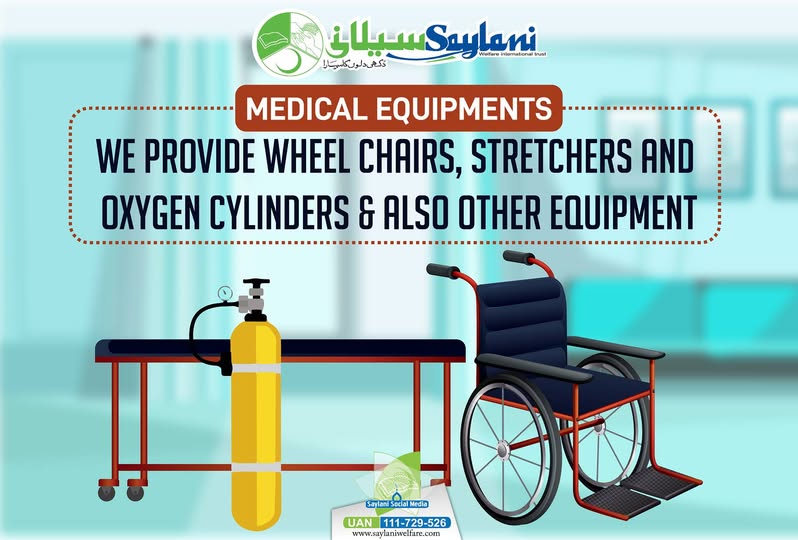
Before and After: The Impact of Donated Medical Equipment in Pakistan
Blog Posted On: July, 18, 2025

Saylani Welfare Organization provides support to individuals in need, with a focus on food, education, healthcare, and medical treatment. Saylani and other charitable organizations enhance societal welfare by mitigating the deficiency of surgical equipment and medical professionals in low-income and middle-income countries (LMICs). Access to medical equipment is crucial for healthcare infrastructure, and due to elevated production costs, low- and middle-income countries often depend on donations from high-income countries. International entities such as the World Health Organisation (WHO) establish protocols for sustainable donations.Medical charity organizations have significantly enhanced treatment capacity at several hospitals, particularly those serving impoverished and vulnerable populations, including refugees. Imagining a loved one in a hospital with inadequate or substandard medical equipment underscores the significance of medical equipment charity. The charm of generosity often manifests during times of uncertainty about a loved one's health.
Overview of Pakistan's Healthcare Sector
The Ministry of Health in Pakistan has delegated healthcare responsibilities to the provinces, which have difficulties due to insufficient medical staff and infrastructure. The private sector is essential in delivering healthcare services since the majority of hospitals, clinics, and health-related institutions in metropolitan regions are equipped with advanced diagnostic capabilities. The federal, provincial, and district levels of government all work together to offer public health services through a system of basic health units, rural health centres, and related medical staff. The government allocated around $785 million to healthcare in the financial year concluding June 2021, while the medical equipment industry is projected to be valued between $500 million and $600 million, with a compound annual growth rate of 15 percent during the subsequent five years (2019-2023). The government enforces no limitations on foreign direct investment in healthcare services and permits the importation of medical equipment under its "Open General" legislation. Pakistan Nuclear Regulatory Authority approval is still required for the import of radioactive equipment. The Drug Regulatory Authority of Pakistan (DRAP) oversees the importation of medical equipment and pharmaceutical products, requiring authorization from producers and importers before they enter Pakistan.
Medical Equipment Charity in Pakistan
Durable Medical Equipment (DME): Chairs, IV stands, hospital beds, walkers, commode chairs, oxygen concentrators, etc.
Surgical & Diagnostic Equipment: Microscopes, Surgical instruments, ultrasound machines, Syringe Pumps, ECG machines, anesthesia machines, etc.
Consumables: Bandages, syringes, gloves, masks, etc.
Other Equipment: Nebulizer, blood bag mixers, Ambu bag, infusion pumps, Blood bag sealers, multiparameter monitors, etc.
Pharmaceuticals: Medications, vaccines, and other medical supplies.
The Healthcare System in Pakistan: Obstacles Before and After Medical Equipment Charity
Problems Existing Before Health Donation
- Rural and underprivileged hospitals lacked access to cutting-edge medical technology.
- There was a lack of cleanliness, inadequate funding, and essential supplies such as medications, food, and water in the facilities.
- The lack of modern equipment limited the ability of medical personnel to provide comprehensive treatment, which in turn prolonged recovery durations.
- Marginalised people in rural regions lacked access to high-quality healthcare due to a lack of facilities, staff, and financial resources.
Improvements Made After the Health Donation
- The use of donated surgical equipment enabled more effective treatment, which in turn accelerated the healing process for patients.
- Healthcare services for Pakistani and Afghan refugees were enhanced by contributions made possible by programs like the Refugee Affected and Hosting Areas (RAHA) program.
- Additionally, the availability and quality of healthcare services, such as specialized operations and diagnostics, were enhanced by donations of equipment.
Post-Health Donation Difficulty
- Many donated devices are old or refurbished, and hospitals don't always have the money or the right kind of biomedical engineers to fix them.
- Hospitals struggle to find replacement parts and consumables that are compatible with their donated equipment, which hinders their ability to keep it operational.
- Some donated equipment doesn't get used at all because hospitals don't have the right kind of training or infrastructure.
What does Health Charity Do?
Unfortunately, access to healthcare and medication is limited in Pakistan. Some people may not have the means to travel to a hospital for treatment, while others may live too far away to access it. The bright side, nevertheless, is that giving back to the community throughhealth donation is like receiving a helpful hand. Imagine it as a token of optimism. Contributions to healthcare causes, whether financial or otherwise, are like petrol for the healthcare engine. Contributes to the construction of new hospitals, renovations to existing ones, and the provision of medical equipment and medications.
Read More blogs
